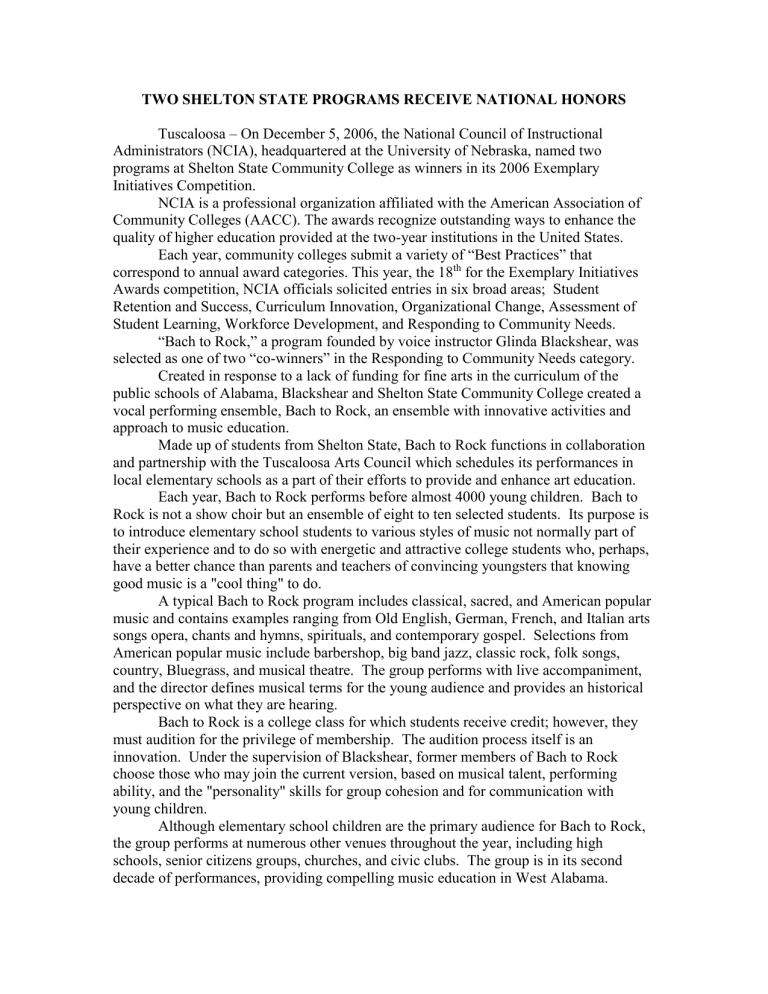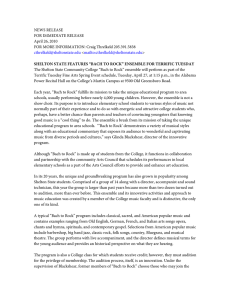TWO SHELTON STATE PROGRAMS RECEIVE NATIONAL HONORS

TWO SHELTON STATE PROGRAMS RECEIVE NATIONAL HONORS
Tuscaloosa – On December 5, 2006, the National Council of Instructional
Administrators (NCIA), headquartered at the University of Nebraska, named two programs at Shelton State Community College as winners in its 2006 Exemplary
Initiatives Competition.
NCIA is a professional organization affiliated with the American Association of
Community Colleges (AACC). The awards recognize outstanding ways to enhance the quality of higher education provided at the two-year institutions in the United States.
Each year, community colleges submit a variety of “Best Practices” that correspond to annual award categories. This year, the 18 th
for the Exemplary Initiatives
Awards competition, NCIA officials solicited entries in six broad areas; Student
Retention and Success, Curriculum Innovation, Organizational Change, Assessment of
Student Learning, Workforce Development, and Responding to Community Needs.
“Bach to Rock,” a program founded by voice instructor Glinda Blackshear, was selected as one of two “co-winners” in the Responding to Community Needs category.
Created in response to a lack of funding for fine arts in the curriculum of the public schools of Alabama, Blackshear and Shelton State Community College created a vocal performing ensemble, Bach to Rock, an ensemble with innovative activities and approach to music education.
Made up of students from Shelton State, Bach to Rock functions in collaboration and partnership with the Tuscaloosa Arts Council which schedules its performances in local elementary schools as a part of their efforts to provide and enhance art education.
Each year, Bach to Rock performs before almost 4000 young children. Bach to
Rock is not a show choir but an ensemble of eight to ten selected students. Its purpose is to introduce elementary school students to various styles of music not normally part of their experience and to do so with energetic and attractive college students who, perhaps, have a better chance than parents and teachers of convincing youngsters that knowing good music is a "cool thing" to do.
A typical Bach to Rock program includes classical, sacred, and American popular music and contains examples ranging from Old English, German, French, and Italian arts songs opera, chants and hymns, spirituals, and contemporary gospel. Selections from
American popular music include barbershop, big band jazz, classic rock, folk songs, country, Bluegrass, and musical theatre. The group performs with live accompaniment, and the director defines musical terms for the young audience and provides an historical perspective on what they are hearing.
Bach to Rock is a college class for which students receive credit; however, they must audition for the privilege of membership. The audition process itself is an innovation. Under the supervision of Blackshear, former members of Bach to Rock choose those who may join the current version, based on musical talent, performing ability, and the "personality" skills for group cohesion and for communication with young children.
Although elementary school children are the primary audience for Bach to Rock, the group performs at numerous other venues throughout the year, including high schools, senior citizens groups, churches, and civic clubs. The group is in its second decade of performances, providing compelling music education in West Alabama.
Awarded an “Honorable Mention” in the Workforce Development category was
Shelton State’s pilot program “Exploring Technology.”
Technical instructors Jason Moore, James Logan, Kenneth Blackwell , Brett
Butler , Lee Tucker and Ronnie Guy created a pilot project “Exploring Technology” which brought 60 area high school students to the campus for a two week intensive exposure to technical areas.
The college experience gave participants with a hands-on introduction to diverse career possibilities, enable them to better identify their career aspirations and help them understand the educational opportunities available to them.
Participating students chose an area that interested them from the four programs offered in the pilot project. Technical programs targeted for the project include: machine tool technology and computerized numerical control, industrial electronics, welding technology, and air conditioning and refrigeration. The student stayed in that program for the entire two weeks observing and participating in class and lab activities. The main focus of the course was to offer all students a hands-on experience and to furnish them with as much information as possible about their educational and career opportunities.
“Exploring Technology” was open to students in the Tuscaloosa County,
Tuscaloosa City and Hale County school systems. In addition to receiving one hour of college credit, participants are paid a daily stipend.
“We are delighted that these two innovative programs were recognized by the
National Council of Instructional Administrators,” said Dean of Instruction Camille
Cochrane. “It proves once again the world-class talent and vision of our faculty as well as their dedication to serving all the students of this area.”





